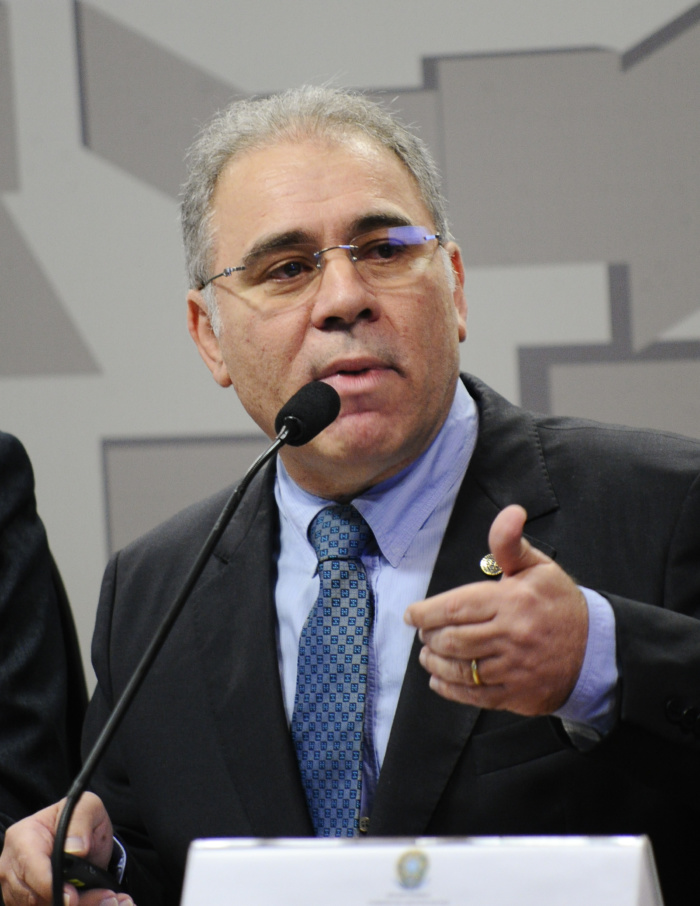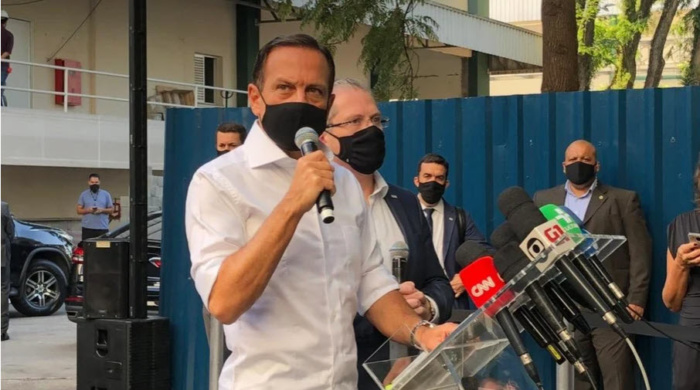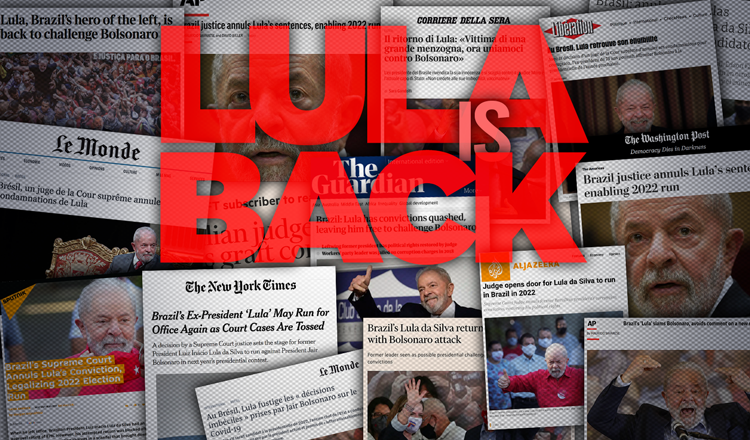After two years of Bolsonaro’ anti-democratic rhetoric and mendacious soundbites, the reappearance of Lula on the political stage was like a breath of fresh air. Once the STF quashed 4 of his dubious sentences for corruption, and he recovered his political rights, Lula lost no time in making a statesmanlike speech to position himself as the anti-Bolsonaro candidate for the 2022 presidential elections. To hear a politician talking in compassionate, reasonable terms was like a balm for the spirit of all those Brazilians who have waited in vain for a word of solidarity from the president of the republic; and to hear him set out his plans for dealing with the pandemic provided a stark contrast to the lack of leadership coming from the Planalto Palace.
Lula did not speak as the leader of a left-wing party but as a statesman during a national emergency, calling for measures to stop the death toll and the spread of the virus.
While thanking his faithful followers who had kept a vigil outside the prison during the 580 days of his imprisonment, he sought to appeal to a much wider audience of other political parties, unions, businessmen in what was interpreted as the first step in building a consensus, a broad front, for the 2022 elections.
He said he wanted to put food on the table of Brazilians when millions are going hungry, after three months without government aid and the promise of a much reduced benefit beginning only in April.
He said he dreamed of a just world, that this world is possible, and called on Brazilians to fight for it, and to take the vaccine, to oblige the government to buy vaccines. He praised SUS (Brazil’s public health service) and paid homage to the victims of Covid-19.
He might be the devil, but I’ll vote for the devil
Lula’s speech received wide coverage in the national and international press, and even conservative business leaders were quoted as saying ‘Lula might be the devil, but rather than Bolsonaro, I’ll vote for the devil’. Or ‘I’ll have to hold my nose, but I’ll vote for Lula’.
A new poll shows that 57% of Brazilians still think Lula is guilty of corruption, but as more evidence emerges that the Bolsonaro family has raked in millions of dollars from schemes involving the diversion of public funds into their own pockets during their terms as congressmen or councillors, the president’s credentials as an anti-corruption crusader are crumbling fast. He is not helped by the alliance of convenience he has forged with the notoriously corrupt Centrão, many of whose members were accused in the Lavajato prosecutions of stealing millions of dollars of public money.
The effect of Lula’s reappearance on the political stage and the recognition that he could be Bolsonaro’s main opponent in 2022, galvanised the pandemic-denying president into a U-turn. Suddenly he believes in vaccination, suddenly he is wearing a mask. He denies he ever called the virus a ‘gripezinha’, a mild flu. He even claims he has an excellent record in fighting the pandemic, and Ricardo Barros, the government’s leader in congress, who is a doctor and former minister of health, unbelievably said ‘the situation is comfortable’ on the very day Brazil recorded its highest number of daily deaths, almost 3,000.
For the hundreds of seriously infected people who cannot get beds in ICUs and the hospital staff collapsing with exhaustion and despair as people die on the floor, the situation is not comfortable but hellish. Brazil, with less than 3 per cent of the world’s population, is clocking up 25 per cent of its deaths.
But Brazil has so far vaccinated less than 6 per cent of the population because Bolsonaro refused to order vaccines last year, even turning down an offer of 90 million doses by Pfizer. General Pazzuello, the Health Minister, claimed recently that over 500 million doses have been ordered from different pharmaceutical companies. But nobody believes the general any more, and in any case he has been replaced by a new minister, heart surgeon Marcelo Queiroga.

However the new minister, whose appointment was announced, has not yet been allowed to take office 1)Queiroga was finally installed in office on 24 March, because Bolsonaro wants to give Pazzuello, in his view ‘an excellent minister’, a new job that will guarantee him immunity from prosecution for the crimes against public health he committed as minister, crimes committed, after all, at Bolsonaro’s command. He even contemplated creating a new ministry for him, making him Extraordinary Minister for the Amazon, but this would involve getting a bill through congress, so has been abandoned.
The sheer insult of putting in charge of the region the man who bears responsibility for the collapse of oxygen supplies and therefore the death of many Covid patients in Manaus and other Amazon towns, is yet another sign of Bolsonaro’s complete insensibility to human suffering. The fact that at the worst point of the pandemia, his efforts are dedicated to protecting his stooge Pazzuello, even if it means the health system is left without a minister, is a graphic illustration of the president’s priorities.

The result is that Brazil has two ministers of health, one incoming, one outgoing, but in practice, there is no minister in charge who can take decisions.
It was Lula again who took the initiative, asking President Biden to convene a G20 meeting and share surplus vaccines. Foreign Minister Ernesto Araujo hurried to catch up, claiming the government was negotiating with the US government.
Congress and governors step into the void
In the void left by the government’s failure to provide enough vaccines, governors and mayors have been forming consortia and negotiating directly with pharmaceutical companies. Congress also decided to step in, and at the beginning of this week the leaders of the two houses of congress, Arturo Lira and Rodrigo Pacheco, flew to São Paulo for meetings with hospital chiefs and leading businessmen to draw up a parallel health plan.
At last sectors who have so far kept quiet about the disastrous Bolsonaro government, have decided to speak up, as the deaths mount and, even in São Paulo, intensive care beds and oxygen supplies are not enough to cope with the demand.
Over 1,500 economists, bankers and business leaders have signed a strongly worded open letter to the president demanding urgent measures to fight the pandemic, stating the obvious – that economic recovery is impossible while the health crisis remains out of control. They urge a nationally coordinated campaign, a basic income for the unemployed and isolation measures.
Among the signatories were former Central Bank chairmen, the directors of leading banks and ex-finance ministers. The president’s reaction to this positioning by heavyweights of the finance sector was a brag-fest to his regular claque of supporters outside the Alvorada Palace, when he told them that only God can remove him from the presidency, because he can count on the population and the armed forces.
What is the military agenda?
So what is the position of the armed forces as they watch the histrionic performances of a demoralised president and the attempts to shield an active service army general accused of causing deaths by criminal incompetence? Are they abandoning the neutrality of the post-dictatorship years to surrender to the comforts of power? Government sites show that the officers at least live very well, buying in 1,200 tons of filet mignon in 2020, 80,000 litres of beer, and 25 bottles of 12 year-old whisky.
Some analysts believe they have no intention of abandoning the president or their widespread insertion in the civilian government, with thousands of officers placed in well paid jobs for which they were not trained. ‘It gets clearer all the time that the armed forces entered wholeheartedly into the Bolsonarista adventure and are unwilling to leave it’, said one.
The message sent in 2018 by Army commander Villas Boas to the chief judge of the Supreme Court, Dias Toffoli, was a veiled threat against granting Lula a habeas corpus that would have allowed him to run for president that year. Now that Lula is back in the running for the 2022 elections, will the military accept him, even as the candidate for a centre-left front?
Of course the armed forces should remain neutral, they should not have a say in who is or is not candidate. But the Bolsonaro government has not only already become a virtual military government, with generals peppered around the ministries and thousands of officers replacing civilians, but it is carrying out a military agenda, revoking amnesties and reparations granted to political victims of the dictatorship, resorting to the National Security Law to prosecute critics of Bolsonaro, especially those who call him a genocide – over 200 such cases so far against internet influencers, cartoonists, journalists – and planning to celebrate the 1964 coup anniversary on 31 March as a ‘mark of democracy’.
In the fast moving scenario of Brazilian politics however, a year and a half is a long time. At the moment, the ‘Centrão’, the loose alliance of centre-right politicians who dominate congress at the moment, largely supports Bolsonaro. But dissatisfaction is growing, and for many of them, who took part in the four PT governments, Lula is not the monster painted by the Bolsonaristas. In fact it is Bolsonaro who is tuning out to be the monster.
Flavio Dino, PCdoB governor of Maranhão, says ‘to defeat Bolsonaro, the left must unite with the centre’. It seems that the PT and the PSDB are already holding talks, and a possible meeting between Lula and Fernando Henrique Cardoso is mooted. FHC recently declared that he regretted annulling his vote in 2018, when he should have voted for Fernando Haddad.
A recent poll showed that for 40% of the population, Lula was the best president since 1985, while only thirty percent of the population believe that Bolsonaro is an excellent president. How long will the demands for Bolsonaro’s impeachment, now totalling 74, remain locked inside the drawer of the president of the Câmara dos Deputados, Artur Lira?
References
| ↑1 | Queiroga was finally installed in office on 24 March |
|---|

